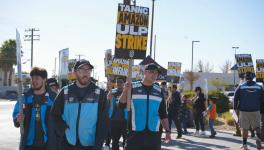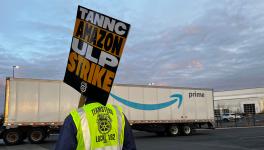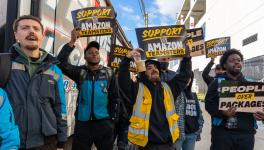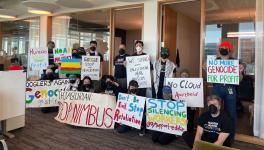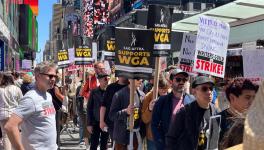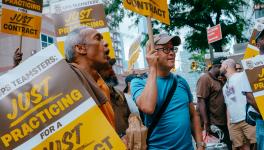Amazon Versus American Union Organisers
ALU's victory was the first successful US unionizing effort in the retail giant’s history
In April this year, the newly established Amazon Labor Union (ALU) unionized the first Amazon warehouse in the United States. With the megacorporation poised to become the largest private sector employer in the country, it was one of the most significant wins for the American labor movement in decades. DW spoke with interim ALU President Christian Smalls about what was the key to the union's success and where the ALU wants to go from here.
DW: Amazon is challenging the ALU's union election at the JFK8 facility. What are they claiming? Do you consider this a major setback for the union effort?
Christian Smalls: This is normal practice from corporations. If they lose, they challenge the results as a way of stalling. That's something that's been done many times before. We've seen this play out before when corporations try to stall legal processes or objection hearings, or stall until the union pretty much gives up or goes bankrupt.
We know that we followed the rules. We just have to prepare on our end and hopefully the board determines the right decision, which is that the workers voted for a union. The majority of the workers in the warehouse voted for the union.
You're used to Amazon's resistance to the union campaign. Can you start from the beginning and chart how Amazon has fought your efforts at the warehouse and how you think that resistance actually affected the union drive?
They've done a number of things. They spent $4.3 million (€4.29 million) to try to stop this campaign. They first started with bringing union busters into the facility. Having them walk around pretty much polling and asking workers questions, spreading a lot of misinformation while they were doing that. Of course, they put up anti-union signs all over the building.
They used the New York Police Department. We were arrested — myself and others were arrested multiple times. They just pretty much tried to divide workers by spreading a large amount of misinformation about myself personally. They tried to demonize me as somebody who was just having a vendetta because I was fired. They tried to say that making the union was a way for me to become a millionaire.
They also had captive audiences where they put workers in classrooms pretty much every 20 minutes every single day for several months in a row.
Standard practice is you get a super-majority of union cards signed before you file for a union election. But you did right at 30%, which is the bare minimum required. What kind of resistance were you facing from people who had traditional ways in mind, and what were you thinking when you decided to go ahead?
We didn't really listen to anybody. We knew that most people thought we were pretty much setting up ourselves for failure trying to organize without an established union, with no resources, without money.
I heard the rumors of people through the grapevine saying that this is a pipe dream, that it's never going to happen. People didn't even expect us to get to an election vote. So, to defeat all the odds and to prove everybody wrong in a sense, it just makes the feeling even better.
It makes the union even stronger. We just have to overcome our next hurdle, which is the objection hearing so that we can get to a bargaining table.
Christian Smalls (center) is the voice and the face of ALU's unionization drive
Before and after the win at JFK8, what has been your relationship with other unions, particularly those also trying to organize Amazon, such as RWDSU and the Teamsters?
Well, I didn't have too much of a relationship with them to be honest. I didn't talk to the Teamsters much. I didn't even talk to the RWDSU as much as people would expect.
I'm still curious about a lot of their claims of organizing Amazon because people say all the time, 'oh, I'm organizing Amazon,' but the only way you organize Amazon is if you actually have workers.
For the Teamsters, I know they claim to be organizing Amazon. We've been talking about it for months and I'm still trying to figure out what their plan is. If they have one that makes sense for us to be involved in, we absolutely will try. But if not, we're going to continue to do our own thing with the Amazon Labor Union.
Workers have reached out to us from several different locations — well, pretty much all the buildings in the country. And we're going to try to organize as many buildings as possible. We're going to hopefully get some assistance from other unions and we will hope to have the support of the Teamsters and RWDSU as well.
You're organizing a national congress of Amazon workers for the summer. Can you tell me what you're planning and what's on the agenda?
We want to address the inquiries en masse. You know, we get inquiries every day from different buildings and different workers. It's hard for us to keep up. So this call is basically just an introduction on the way to organize.
We want to set people up for success. We don't want people to just go out there and start organizing, getting targeted and getting fired. So we're just giving them the basic information, some protections, some educational tools that they're going to need and what we're doing now.
What you're going to see in a couple of days is other buildings that are underneath the ALU umbrella start to launch publicly. And we're going to start working with buildings that are ready to go.
Labor organizers and activists are hoping that we're on the precipice of another labor upsurge and not just a blip. How can the labor movement ensure it's truly an upsurge, and what's the role of Amazon organizing in that effort?
I know for me this is the long haul. I always say it's not a sprint, this is a marathon. I know my union in particular, we all invested in this for the long haul. We always say that we're not here for the short term. We're not going to leave or quit. We're going to continue to push forward no matter what happens — and stay together.
I think the country is feeling and reciprocating that energy as well. Not just here in the States, but also in other countries. There's definitely a lot of buzz in the labor movement right now. So we want to keep it that way.
If we continue to organize there's definitely going to be somewhat of a revolution, if not it's already started when it comes to the working class.
This interview was conducted by Teddy Ostrow and has been edited for clarity and brevity.
Get the latest reports & analysis with people's perspective on Protests, movements & deep analytical videos, discussions of the current affairs in your Telegram app. Subscribe to NewsClick's Telegram channel & get Real-Time updates on stories, as they get published on our website.










